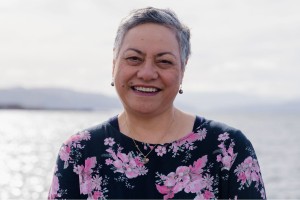
What drove you to become a celebrant?
It started with my long-time neighbour who asked me to conduct his ceremony when he passed. I joked, "God willing, I outlive you," and we laughed. That conversation set me on the path to celebrant mahi. I noticed a gap in Taranaki - many celebrants, but few Māori, particularly in South and Central Taranaki. With Neville’s support and my rural community in Kaponga, I became a celebrant which I consider to be an extension of my services as a Justice of the Peace.
What involvement have you had with CANZ?
Aside from attending the AGMs, professional development, and branch meetings, I have been minimally involved with CANZ. Until Dr. Iwi Te Whau took on a leadership role in our region, he encouraged me after this year's conference to join our National Executive. It has felt like the right time and place for me to offer my support and I am extremely excited to be joining an incredible group of committed colleagues.
Tell us about the ceremonies you perform
Every ceremony I have performed has been 100 percent couple and whānau driven. It’s a cliche but it really is an honour to be a part of any occasion, and my role is to be whatever the couple or whānau needs within my capabilities as a celebrant. Manaakitanga (caring) and aroha (love) guide my work which I believe is often spiritually led and unfolds naturally.
What do you enjoy most about being a celebrant?
That I get to be part of someone's special day whether it's matrimonial, closing of a life or other occasion. I conduct karakia before leaving home and on arriving at the venue in private, to protect and guide the occasion. What I enjoy most about being a celebrant is the social aspect, connecting with whānau and friends whomever, even if it is fleeting. Key to all I do is to be of service to people. He aha te mea nui, he tangata, he tangata, he tangata. What is the most important thing, it is people, it is people, it is people!
What are the hardest parts of the job?
The lack of appreciation for the use of Te Reo Māori in ceremonies by some attendees. Focussing on what the couple or whānau have asked me to do helps me to stay tūturu (authentic) to the occasion. Getting a balance on how flexible one can or should be particularly when it comes to changes to the ceremony at the last minute. Being asked to be a stand-in celebrant – make sure to check all the details before accepting.
Most memorable ceremony?
My first and only tangi to date. It was for a Kaumatua in his 90s. The brief from the whānau was no religion, no morbid or solemn messages, the service must encourage laughter and especially music because Koro was a musician. At the end of the service the funeral director gave me a huge smile and a thumbs up as Koro departed amongst ukelele playing and hearty acapella singing that went on long after the hall had completely emptied. The feedback from attendees was humbling and the whānau were happy when they left the service stopping to wave at me and signal their thanks with love.
What’s a typical day like?
I start my day always with a short karakia giving thanks for a new day and asking the Lord to take care of me and my whānau and anyone else that needs prayer. Bruce, the neighbour's Hunterway takes me on a walk to Victoria Park where we pick up rubbish. It's very satisfying leaving the park looking spotless every day. Depending on what job I am in because I have a portfolio of jobs namely; working as an EA for my Iwi - Ngāruahine Iwi Authority two days a week, a Vocational Consultant with Active+ three days a week, and my celebrant and JP mahi after hours or weekends. Most evenings dependent on what is on top for me consist of professional development in either my CANZ or CDANZ work, my Te Reo classes or it could be my secretary and treasurer roles for my hapū and other trusts that I am on. What is consistent is that I would normally end my day by looking at the latest antics that my two mokopuna have been up to via Snapchat or Facebook. It is the highlight of my day.
Advice for someone new to the industry?
Register with CANZ, start training, and find a mentor. The wisdom shared by fellow celebrants - young, seasoned, and everyone in between - is invaluable. Having a buddy early in my own celebrant career I believe would have been extremely beneficial.
How do you relax?
I do strength and balance classes for the matured age group. It’s surprisingly impactful. I also cherish time with my husband - watching a movie together, sipping Craggy Range Pinot Noir, and on other occasions indulging in a Yarrows cream donut with a fancy coffee.
[Photo: Belinda Pratt Photography]
